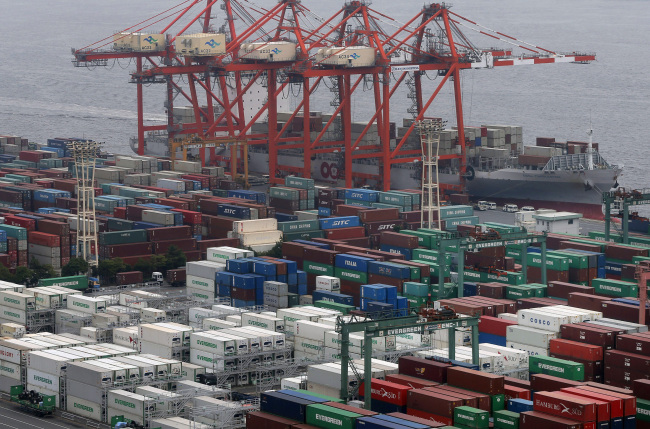Japan reported a wider-than-expected trade deficit in July as Europe’s sovereign debt crisis and a slowdown in China dragged down exports and higher oil prices boosted imports.
The shortfall was 517.4 billion yen ($6.5 billion), after a revised 60.3 billion yen surplus in June, the Finance Ministry said in Tokyo Wednesday. The median forecast in a Bloomberg News survey of 28 analysts was for a 270 billion yen deficit. Exports fell 8.1 percent from a year earlier, compared with an estimated 2.9 percent decline. Imports rose 2.1 percent.
Strength in the yen and weakness in global demand threaten to curb exports over the rest of this year, undermining the economy’s recovery after a contraction in 2011. Japan’s ninth deficit in 12 months underscores the country’s reliance on energy imports after atomic plants were shut down following last year’s earthquake and nuclear disaster.
 |
Containers pack a container terminal at a pier in Tokyo. (AP-Yonhap News) |
“It’s unavoidable that Japan’s economic growth will lose steam this quarter,” said Kohei Okazaki, an economist at Nomura Securities Co. in Tokyo. “Global demand is looking stagnant as China’s economy is slowing while the advanced nations’ economies remain weak.”
The yen traded at 79.21 per dollar as of 9:02 a.m. in Tokyo, up more than 5 percent since mid-March. A stronger currency erodes export sales and profits. Wednesday’s level compares with a post-World War II high of 75.35 in October.
Shipments to the European Union fell 25 percent in July from a year earlier, the biggest decline since October 2009, while those to China slipped 12 percent, the ministry said.
Japan’s gross domestic product advanced an annualized 1.4 percent in the three months through June, down from 5.5 percent in the first quarter.
“Japan has been struggling to regain export momentum as the global economy cools,” Junko Nishioka, chief economist at RBS Securities Japan Ltd. in Tokyo and a former central bank official, said before the report. “The trade deficit is likely to remain for the time being.”
Sony Corp., Japan’s biggest consumer electronics exporter, cut its full-year profit forecast on Aug. 2. Sharp Corp., the nation’s largest maker of liquid-crystal display panels, announced the same day it would eliminate 5,000 jobs worldwide in its first job cuts since 1950.
Japan has augmented its energy requirements through increased imports after shutting nuclear reactors for safety tests after last year’s meltdown in Fukushima.
“It’s totally unrealistic to expect a swift recovery in nuclear plant operations,” Masaaki Kanno, chief economist at JPMorgan Securities Japan Co. in Tokyo, said before the report. “We should assume an elevated level of energy imports.”
(Bloomberg)








